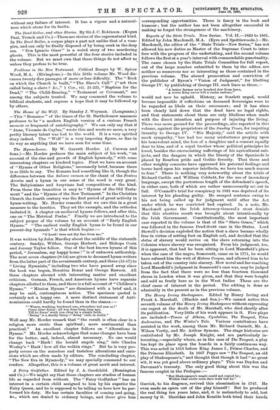The Hymn - Lover. By W. Garrett Horder. (J. Curwen and Sons.)—Mr.
Horder prefaces the main subject of his work, " an account of the rise and growth of English hymnody," with some interesting chapters on kindred topics. First we have an account of " Hymns of Other Religions," necessarily brief, because there is so little to say. The Romans had something like it, though the difference between the Saliare carmen or the chant of the Fratres Armies and a hymn in our sense of the word is very great. The Babylonians and Assyrians had compositions of the kind. From these the transition is easy to " Hymns of the Old Testa- ment" and the " Hymns of the New Testament." In the Christian Church the fourth century was the first period of great activity in hymn-writing. Mr. Horder remarks that we owe this in a great measure to the heretics. They set the example, and the orthodox imitated it. A chapter on mediaeval hymns follows, and after this, one on " The Metrical Psalm." Finally we are introduced to the subject proper of the volume by an account of "Early English Hymns." "The earliest really English hymn to be found in our present-day hymnals " is that which begins :- "0 Lord! turn not thy face from me."
It was written by John Mardley about the middle of the sixteenth century. Sandys, Wither, George Herbert, and Bishops Cosin and Jeremy Taylor follow. One of the best known hymns of this period, " Jerusalem, my happy home !" is of unknown authorship. The next seven chapters (8-14) are given to deceased hymn-writers from the latter part of the seventeenth century, and three (15-17) to "Living Hymnists," including two who have passed away since the book was begun, Horatius Boner and George Rawson. All these chapters abound with interesting matter and excellent criticism. German, French, and American hymns have separate chapters allotted to them, and there is a full account of " Children's Hymns." "Mission Hymns" are dismissed with a brief and, it may be said, contemptuous notice. The specimen quoted is certainly not a happy one. A more distinct statement of Anti- nomianism could hardly be found than in the stanza :—
Weary, working, burdened one, wherefore toil you so ?' Cease your doing: all was done bomb long ago. Till to Jesus' work you cling by a simple faith, ' Doing' is a deadly thing—' doing' ends in death."
Well may Mr. Horder remark that " the result is often clear in a religion more erotic than spiritual ; more sentimental than practical." An excellent chapter follows on " Alterations in Hymns." Mr. Herder acknowledges that some changes have been for the better, and, indeed, almost necessary. No one would change back "Hark ! the herald angels sing," into Charles Wesley's " Hark ! how all the welkin rings." But he is very pro- perly severe on the senseless and tasteless alterations and omis- sions which are often made by editors. The concluding chapter, "The New Era in Hymnody," we may specially commend to our readers. Altogether, this is a volume of great merit and interest.


















































 Previous page
Previous page